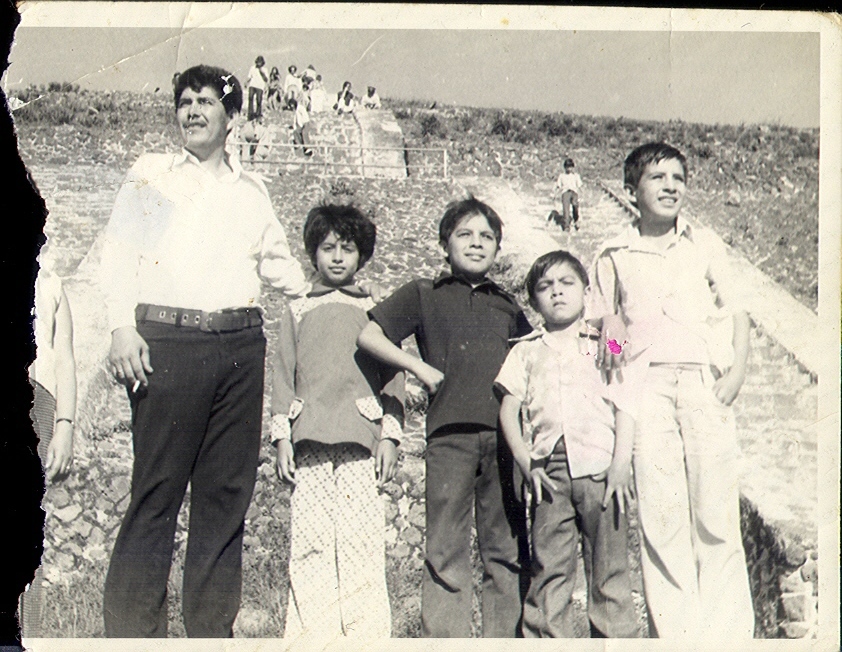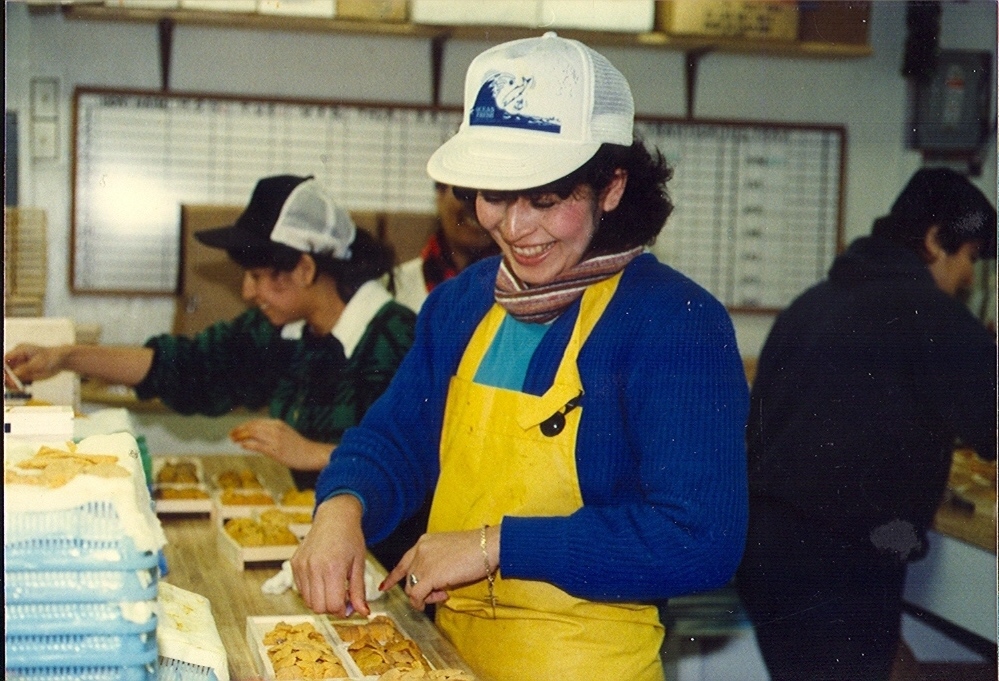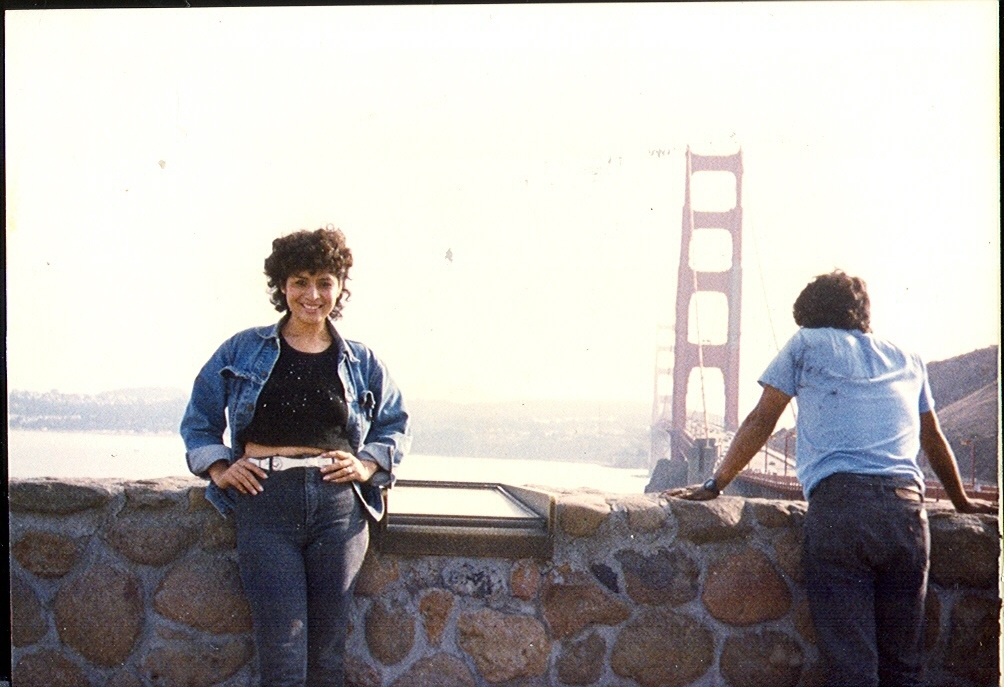TRANSCRIPTION
(This interview was conducted in Spanish and translated in English)
What are your earliest childhood memories?
I remember playing outside with all the nieghborhood kids and my brothers. Well I would watch my older brother and sisters play soccer and when I got a little older I would attempt to join them. I wasn't too bad if I say so myself.
Where exactly were you raised in Mexico?
Monterrey, Mexico in Nuevo Leon.
Why did you initially migrate to the United States?
To help out my family with the money I earned in the U.S. I sent money over every two weeks when I would get paid.
What was the most difficult thing for you while you were growing up in Mexico?
The hardest thing was that their was not a lot of opportunities or jobs. If there is jobs then you earn very little, twenty five dollars every week working Monday through Friday. However I'm talking to you in the times back then when I was sixteen.

Describe your journey into the United States?
Well the first time that I went to the U.S, I came with a tourist visa. I was here for three years then I came back to Monterrey. I was in Mexico for six months but the next time I crossed over I came as a "Wet-back." I went on a tour bus to the border, got a coyote to pass me and my daughter over. From 6am to 2pm, we were waking the desert, hiding in the brush from the choppers. The coyote next took us to Los Angela's.
Describe a typical day in Mexico for you before you left?
I worked from Monday through Friday. I had the weekends off and that was dedicated to family. We would gather together, eat menudo, soup or tortillas, well something special because all of us were together. Sunday's I would go to the movies with my friends.
Did you ever experience discrimination in the work place?
YES! My first job I had was working as a buser at a restaurant, I worked two weeks straight and when I asked for my pay check at the end of the two weeks they told me that I wasn't going to get paid because I was an illegal. However I worked two whole weeks with out pay! Alot of discrimination.
What is your most cherrished memory that you have of Mexico?
In reality, the close family atmosphere, my friends. Over there you could be free in the sense that you didn't have to watch out for the Immigration police. Or worry about finding a job that you may have to flee from. Back then, there was a lot more immigration police around.
What was your first job in the United States and how much did you get paid?
Honestly, I was a buser at a restaurant. I can't tell you how much because I was never paid for the work I did. Two whole weeks! After that I worked for a Chip company, I remembered I earn 4.25 an hour.
How much was the typical salary for a typical job in Mexico?
Right now I don't know but back then I worked at as in inspector for a laundry company. I earned 30 dollars a week.
What are you most proud of, looking back at your journey in the United States?
I'm proud that I progressed with my life. Had my family. I put my kids first, taught them respect, and gave them an education. My happy because I feel fulfilled as a woman, a mother, and grandmother. Now a day's I'm a grandmother. I'm proud that I work and bring my family forward.
How was your relationship with your siblings, having such a big family?
All together it was six girls and three boys, including me. A house with two bedrooms, a curtain between the living room and kitchen, and despite the space we were all so happy. We were so poor. Instead of playing with Barbie's, we would play with twigs from the trees, rock; we would use the broom stick and pretend it was a microphone and sing. We were really poor but despite what we lacked, it was a wonderful childhood. If I could do all over again, I wouldn't change a thing. Of course, I and my siblings fought once in a while and now when we have family reunions we laugh about those days. We were poor but we were happy.

Why did you only go up to the sixth grade?
In reality, the books started to become too expensive and to be honest I didn't like school. I didn't want to waste my parent's money if I didn't like it or plan to pursue more of an education. I put myself to work
If you could go back and change your mind about dropping out of school, would you?
Well at the time, I felt like it was right thing to do. We were poor and I wanted to help my family out. Not to mention I wasn't a big fan of school. However, looking back at it I would definately finish school all the way through.
Who provided for the family?
Well my mom and dad both took care of us, feed us but my mom never worked. Only my dad. He worked for several years in an iron company. He worked there until the company closed down and never worked since then. My parents never went to school. My mom taught herself how to read and write.
How did you feel about the U.S when you initially got here?
I felt lonely, lonely without any help, support. I felt that society didn't want me. I didn't know any English. Sad and lonely but I knew I had to keep driving on because I knew that my future was with the U.S.

What do the people in Mexico, think of the U.S?
They use to think that the U.S would open the doors to better jobs, more money for their families, bring the family forward. They think that money pretty much just falls onto your lap, but what they soon come to realize is that you have to work really hard for everything you have. If you have a new car, that's because you still owe the bank for it. If you have a house, that's because you still owe that too. Everyone thinks it's so easy, but it's not as easy as one may think.
Describe a challenge that you were able to overcome living in the U.S?
It was buying my own house, working jobs I never thought I would have. Become an American citizen, learn English. I knew that I deserved all the right the American's have so I wanted to be a citizen so I could have the same rights like everyone else… for my kids.
Out of all the places you've resided in, which one was your favorite?
Honestly, San Antonio. I feel like I can identify with the people here, it almost feels like I live back in Mexico. Everyone talks English and Spanish and in California, they don't. There was a lot of discrimination there.
After living in California for fifteen years, why did you decide to move to San Antonio, Texas?
Even though I miss living in Fort Bragg, I knew that we had to make a move to Texas. Most of my family lives in Houston, Texas and they told me how great Texas was. California's cost of living is way too high and my family explained to me how everything was cheaper, their was more opportunities for jobs and so much more. They always wanted me closer to the rest of the family but what convinced me was that I knew I could afford to buy my family a house. Not only buy them a house but college would be more accessible to them.
What kind of jobs did you have in the U.S and were they what you expected?
I've worked anything from housekeeping, working in a restaurant, manual labor, working at ocean factories and working as a custodian at a hospital. Yes, they were what I expected. I knew that since I didn't have an education I wasn't going to have a desk job or anything fancy but I always worked hard in everything I do. Even if the jobs I've had weren't the best, the satisfaction that I was doing everything for my kids was enough for me.

If you could go back and change anything in your life, what would it be?
I would have like to have continued my education and not have dropped out so I could have more of a professional job. Have better opportunities, job wise.
Is there anything else you would like to add to this interview?
Well, I fell happy for leaving here. All my kids are happy here. The U.S has given me many of opportunities and I thank God for blessing me.
 <
<
 <
<